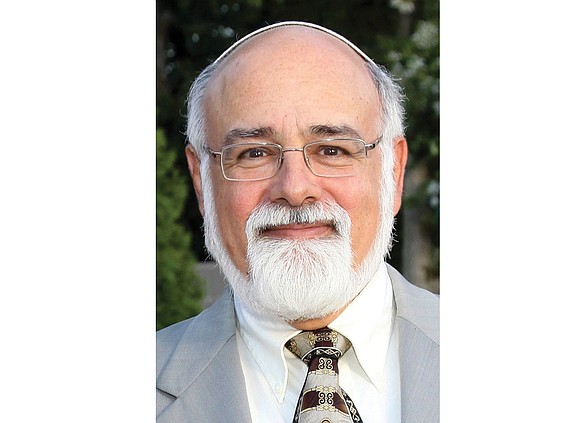Personality: Rabbi Gary Creditor
Spotlight on the Va. Interfaith Center for Public Policy’s Richmond Chapter leader
12/22/2017, 3:14 p.m.
The Virginia Interfaith Center for Public Policy is the unique place where people of different faiths and backgrounds come together to work on issues of social justice.
“Through the faith communities coming together at the Interfaith Center, we are able to focus on parts of our community, the wide community, that are disadvantaged,” says Rabbi Gary Creditor, the leader of the center’s Richmond chapter.
Many of the organization’s efforts are aimed at advocacy for legislative initiatives and educating people across the state to become involved to influence their elected representatives and public policy. VICPP also partners with like-minded organizations and fosters new relationships with others to focus on critical issues.
“We find areas of inequality and injustices in parts of our community that can unite us,” Rabbi Creditor explains. “So we develop that issue and lobby the General Assembly to change or create better and just laws.”
Educating the public also brings together people of different faiths “with a uniting vision for a better humanity,” he says. “Social and economic equality can be achieved through that education, coupled with legislation.”
One of VICPP’s top priorities: To expand Medicaid in Virginia, the health care program that helps low-income individuals and families. About 400,000 people would be helped by such an expansion, state officials have estimated. While efforts to expand the program have been thwarted for several years in the Republican-controlled General Assembly, Rabbi Creditor believes progress may be possible in the 2018 Assembly session.
“I am optimistic about our community. We can always point to the things that are wrong or negative. But I see more people coming together across lines,” he says.
The 69-year-old rabbi who grew up outside of Newark, N.J., has served at six temples from New York, New Jersey and Connecticut to Maryland and Virginia, coming to Temple Beth-El in Richmond in 1993.
He has participated on countless boards and community agencies in an effort to build a better world. After the mass shooting at Virginia Tech in 2007, he was asked by then Gov. Tim Kaine to participate in a memorial program for the slain students and faculty.
After 21 years of service at Temple Beth-El, he retired in 2014, but continues to teach Talmud and Torah study classes. “Unfortunately, we can’t fix everything,” Rabbi Creditor says. “We can’t do everything for everybody. We have a long way to go, but we are working together to better our world.”
Meet this week’s Personality and social justice advocate Rabbi Gary Creditor: No. 1 volunteer position: Richmond Chapter leader of the Virginia Interfaith Center for Public Policy.
Occupation: Rabbi, retired. Rabbi emeritus of Temple Beth-El in Richmond.
Date and place of birth: Nov. 10 in Brooklyn, N.Y.
Current residence: City of Richmond.
Alma maters: bachelor’s degree, Columbia University; B.H.L., M.A., Rabbinic Ordination and doctorate, Jewish Theological Seminary in New York.
Family: Wife, Ruby Eisenberg-Creditor, a hospice social worker; son, Rabbi Menachem Creditor, a congregational Rabbi; and daughters, Rabbi Lt. Yonina Creditor, a U.S. Navy chaplain, and Tzeira Ostrovsky, operations manager of Independence Hall Museum in Tel Aviv, Israel.
Virginia Interfaith Center for Public Policy’s mission: To advocate for economic and social justice in Virginia’s policies and practices through education, prayer and action.
VICPP’s No. 1 challenge: Working in an ever-changing political environment to persuade legislators to embrace our vision of social justice.
How and why I find time for this volunteer responsibility: Because VICPP is unique in that it brings together representatives of all the faiths wherein their different faiths unite them in pursuing issues of social justice for all people in the commonwealth. Because of its importance, I worked my schedule before retirement as best as possible to contribute. In retirement, I have more time available. I originally met the center as a representative of the Richmond Rabbinic Association to the board and maintained my connection ever since.
Status of racial, religious and cultural relationships in Richmond: Richmond is an increasingly diverse city and there are many organizations working to connect everyone. We are a work in progress. The VICPP is an increasingly diverse organization as well. There are good religious relationships between Christian, Jewish and Muslim communities. The City of Richmond government is moving in the right direction. The biggest issue spanning all sectors of the population is education and its facilities so that the students will be prepared to be productive citizens and capable of filling jobs in the new economy, which is the main address to alleviating poverty and diminishing crime. Integration of the city will lead to integration of the schools. While the issue of the monuments has been a flashpoint because different parts of our population react differently, moving them still will not address the central issues of education, jobs, living wage, health care and crime, which are all one continuum and interconnected.
How I start the day: I thank God for life each day, the opportunity to make a difference and to love my family.
A perfect day for me is: Spending it with my wife, no matter what we are doing, and with our children and their families whenever they visit us or we visit them.
Something I love to do that most people would never imagine: I am working on family genealogy.
A quote that I am inspired by: Love thy neighbor as thyself.
How I unwind: Listening to country music or reading Sherlock Holmes.
The person who influenced me the most: The first rabbi of my home congregation in Belleville, N.J.
What I’m reading now: I’m working on several books concerning the Talmud, which I teach at Temple Beth-El.
If I’ve learned one thing in life, it is: To have a long and wide vision. It gives a greater perspective of people, events and dynamics, coupled with patience.
My next goal: To see progress in the 2018 General Assembly on issues of social justice.






